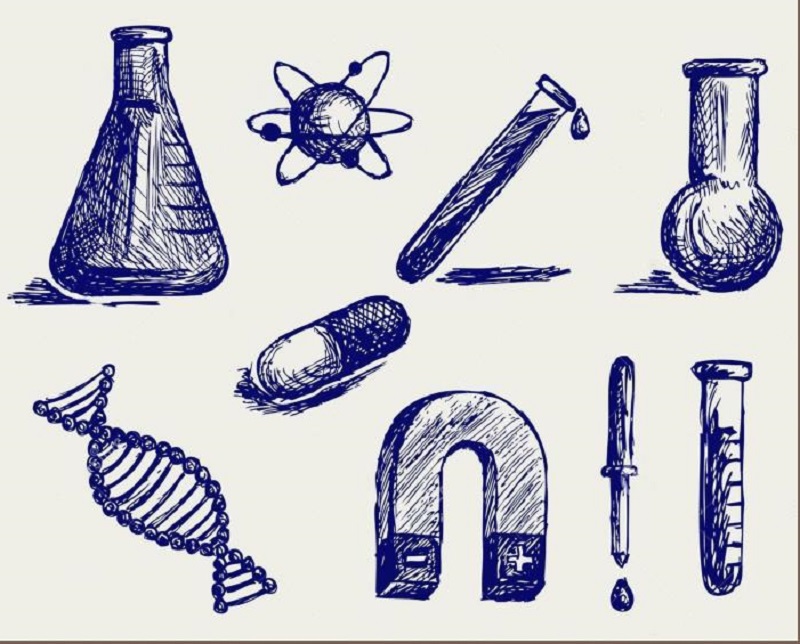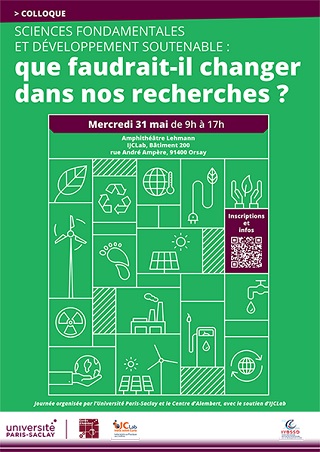
Université Paris-Saclay, and the Centre d'Alembert are organizing a symposium on May 31, 2023 on the theme of "Basic sciences and sustainable development: what should change in our research?" What new ethical questions do environmental degradation and persistent economic and social inequalities pose for research?
The degradation of our environment and the persistence of economic and social inequalities on all scales are realities that challenge the world of research, far beyond those who specialize in these subjects. As part of the International Year of Basic Sciences for Sustainable Development, Université Paris-Saclay has decided to address the ethical issues raised by these findings for the research community, both in theory and in practice.
The environmental crisis illustrates once again that the distinction between basic and applied science is primarily linked to the context of a given era: knowledge that was once considered fundamental is now highly topical, while research that is far removed from everyday life bases its social utility on the promise of future applications that will enable us to overcome the ecological challenge.
Growing ecological awareness is leading to ever stronger criticism of research subjects whose consequences are, or could be, harmful to the environment; and some are even questioning the usefulness of basic research, which is deemed not to be a priority in the face of urgency.
Are the arguments of serendipity and the race for excellence good compasses when the window of opportunity for action is reduced to the scale of a decade? If the scientific approach is supposed to be as neutral as possible, the progress of research cannot be dissociated from the social and cultural environment in which it takes place: would it then be legitimate to call for a genuine (re-)orientation of research to respond to the urgency of the situation, notably climate change - and if so, how can this be implemented?
Science and its technological applications have undeniably shaped the world we live in, particularly in Western societies. Science has also informed us of the dangers that result, and of solutions to counter them - if, of course, collective decisions were taken. In a paradox that is only apparent, criticism of the excesses of "techno-science" and the abandonment of the idea of a one-to-one link between scientific progress and human progress have also often come from the academic world. But to what extent is the autonomy that allows this reflexivity a reality, and is it compatible with the urgency of the times?
Finally, it is clear that the production of scientific knowledge is an activity with significant environmental impacts. Quite apart from the discussion of aims, how can science be carried out in a way that minimizes its impact, i.e. with responsible practices? Over and above individual choices, how far should the community go in structuring itself and establishing its own operating rules?
 PROGRAM
PROGRAM
8.45am - 9.15am: Welcome
9.15am - 10am: Opening
- Estelle Iacona, President of Université Paris-Saclay
- Julien Gargani, Director, Centre d'Alembert
- Michel Spiro, Chairman of the Executive Committee of the International Year of Basic Sciences for Sustainable Development (UNESCO)
- Sophie Szopa, VP Sustainable Development, Université Paris-Saclay
10h-11h15: Research topics: endless science? Host: Laurent Audouin
- Paul Leadley, ecologist, Université Paris-Saclay: From systematics/conservation to biodiversity, when non-financial basic sciences become relevant to sustainable development
- Pierre Morel, physicist, Plasma Physics Laboratory, Université Paris-Saclay: Fusion: the energy of the future?
A Promethean dream if ever there was one, thermonuclear fusion combines on paper the advantages of releasing titanic energy with the fact that it does not directly create a radioactive product. However, controlling matter in its plasma state, heated to hundreds of millions of degrees for fusion reactions to take place, proves to be a serious technological challenge. Indeed, the medium is extremely turbulent at such temperatures, and tends to oppose the magnetic confinement imposed on it.
After defining the main principles, Pierre Morel will discuss the importance of thermonuclear fusion research in the context of future global warming. He will also present the structuring of research in this field, between public and private institutions, its financing, interactions, announcements and recent results. Finally, using the example of his own personal trajectory, and that of his team, he will attempt to answer the Grothendieckian question "...what's next? Are we going to continue scientific research? ".
→ Discussions with the audience 10:50-11:15 a.m.
-11.15-11.30 a.m.: break
11:30am-1pm: Research practices: changing the way we do research? Moderator: Sophie Szopa
- Anne-Laure Ligozat, Labo 1point5
- How to search in 2023" round-table discussion
o Hélène Aubry, Professor of Law, Université Paris-Saclay, Faculté Jean Monnet
o Yves Langevin, planetologist, Emeritus Director of Research at CNRS
o Gaëlle Lextrait, doctoral student in microbiology, CNRS, Université Paris-Saclay
o Daniel Suchet, lecturer in the physics department at École Polytechnique, Institut du Photovoltaïque d'Ile de France
o Anne-Laure Ligozat, Labo 1point5
→ Discussions with the audience 12.45-1 p.m.
-1 - 2 p.m.: Lunch break
14h-15h15: Knowledge production, value production, research values: how does sustainable development challenge us? Host: Hélène Gispert
- Stéphanie Ruphyphilosopher of science, École Normale Supérieure (Ulm) - Université PSL : Making a commitment through the choice of research topics: epistemological and political issues.
A researcher's commitment can take many forms: activism, taking part in public debates, providing expert advice to decision-makers, taking part in citizen science projects, and so on. At a time when research is increasingly expected to make a greater contribution to meeting many "societal challenges", choosing a research topic that directly addresses these expectations appears to be a form of commitment in its own right. In this presentation, I will explore various epistemological and political issues raised by such a form of commitment: does it not come into tension with the unpredictability of scientific inquiry? Is there a risk that science will eventually lose its fruitfulness?
- Anouk Barberousse, philosopher of science, Sorbonne University, director of the Institut de la Transition Environnementale : Building knowledge for the ecological transition: a cultural upheaval.
Some of the knowledge needed to implement an effective ecological transition has yet to be built up. This knowledge must transform both modes of economic production and behavior. Yet the scientific communities capable of producing this knowledge are not yet accustomed to taking on questions that do not come from their own research dynamics, but from outside the academic world. Adopting new habits means agreeing to profoundly transform the research cultures specific to different disciplines. This presentation will outline the challenges of such a transformation.
→ Discussions with the audience 14h50-15h15
3.15pm-4.30pm: Research organization: how does sustainable development challenge us? Host: Julien Gargani
- Pascal Dayez-Burgeon, Secretary General of COMETS : Présentation du dernier avis du COMETS sur l’éthique environnementale de la recherche.
Saisi par le PDG du CNRS, le comité d’éthique du CNRS (COMETS) a rendu en décembre dernier un avis qui recommande de considérer l’environnement comme une condition de la recherche responsable et donc une composante de l’éthique de la recherche. A ce titre, le monde de la recherche a la responsabilité de limiter les impacts environnementaux de ses activités, qu’il s’agisse de ses pratiques mais aussi des sujets abordés et des voies pour les mener. Compte tenu de la complexité de ces questions et des difficultés pour les rendre opératoires, le COMETS recommande que le monde de la recherche lance une réflexion approfondie sur ces questions.
- Table ronde sur l’organisation de la recherche et la politique scientifique (orientation des financements ; fléchage des recrutements ; maintien de la diversité disciplinaire et des pratiques de recherche) :
o Cynthia Colmellere, sociologue, CentraleSupélec, graduate school sociologie/science politique
o Thierry Doré, agronome, vice-président recherche Université Paris-Saclay
o Pascal Dayez-Burgeon, secrétaire général du COMETS
o Arnaud Saint-Martin, sociologue, CNRS
o Sophie Kazamias, physicienne, Université Paris-Saclay, graduate school physique
→ Échanges avec la salle 16h30-16h45
16h45-17h : Mot de clôture
NB : les titres de certaines interventions sont provisoires. Uni
Evénement organisé avec le centre d’Alembert, dans le cadre de L’Année internationale des sciences fondamentales pour le développement durable, Assemblée générale des Nations Unies, avec le soutien d’IJCLabet le soutien d’IJC Lab.
Entrée libre, compulsory registration


